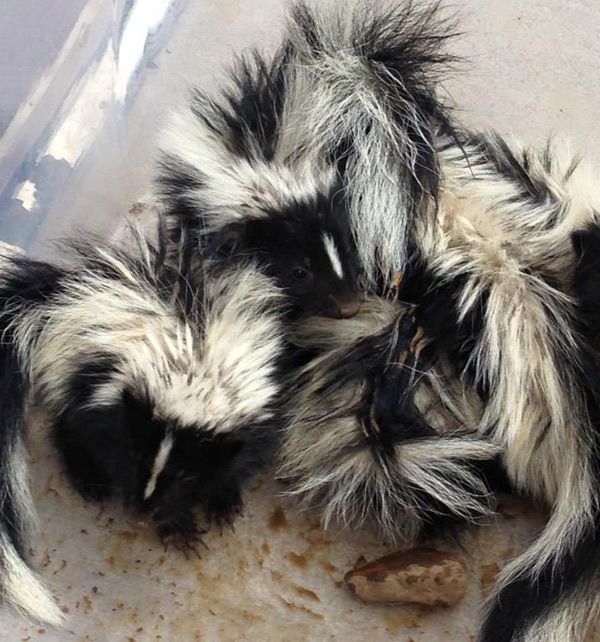- info@wildlife-removal.com
Call us for help in your town
Wildlife Removal Education
Skunk Repellent
Need skunk removal in your hometown? We service over 500 USA locations! Click here to hire us in your town and check prices - updated for year 2020.
Several kinds of skunk repellants are available to homeowners who would rather not have the striped mammal come into their space at all. Like most other repellents used for wildlife animals, they are targeted at the skunk’s sense of smell. When effective, repellents save homeowners the cost of repairing damaged facilities and also, keeps the risk of zoonotic diseases at bay. The skunk is particularly notorious for being a major carrier of the rabies virus. Scary!
In general, most repellents aren't very effective. The best approach is habitat modification. Read here about how to keep skunks away. There are many things you can do to help prevent skunks from using features
of your property habitually. But I'll be honest, if repellents and habitat modification don't work, trapping and removal is the only real permanent solution.
If you need skunk help, click the nationwide directory of Professional Wildlife Removal Companies, and you'll find a skunk expert in your town or city.

SKUNK REPELLENT - It is important in the use of repellent substances, to first mark out the skunk’s favorite spots in your home and its damage areas. These may include the garbage cans, underneath the porch or shed, or underneath a fruit tree. Skunks will also leave small, cone-shaped holes in your lawn and garden when they dig for grub.
Types of Skunk Repellent:
1. Liquid sprays: these skunk deterrents are sold commercially and are mostly based on fox and dog urine as they are major predators of the skunk. These products come in liquid spray form and may require mixing with other ingredients. However, these predator urine-based products do not exactly have a great track record in repelling skunk. If you can source it, straight dog urine has a slightly better chance. Spray on garbage cans, wood piles, plants and other surfaces your skunk finds interesting. Remember to shake spray before application.
2. Repellent granules: these are also formulated based on predator urine and can be used to drive a skunk out of its burrow. Sprinkle granules at the entrance of a burrow so that the skunk will have to walk through when it exits and enters. Ideally, the irritation caused by the repellent will make a skunk uncomfortable and eventually drive him out. Use also on porches, sheds, gardens, and flower beds.
3. Ammonia and pepper sprays are also believed to deter skunk and other wildlife. Spray them on trees and other areas where you've sighted the traces of a skunk. Proceed with caution however, especially in the case of the pepper spray as it can have distressing effects on unintended targets – children, pets, or even the person applying it. Ammonia is reputed to repel most wildlife due to its pungent smell. Placed old rags dipped in ammonia under your deck or porch to keep skunks out. Ammonia is particularly distressing to the eyes and nose of wildlife and has a better chance at being effective when applied in an enclosed space.
4. Electronic sprinklers: these are placed out in the yard and when activated by an inbuilt motion sensor, would startle any animal that passes with a burst of water. This chemical-free option is meant to startle them into running away. Largely effective as skunks tend to avoid such areas, but again, if there is food to be reached, they find a way around it with time.
5. Citrus peels have natural repellent qualities. Scatter orange or lemon peels around your property and under your deck or porch
6. Install bright lights in your yard. This will discourage the skunk as it is nocturnal by nature. You may however consider using solar lighting or energy-saving lighting to avoid paying high electrical bills.
Note: It is important that you study your skunk’s behavior patterns and den locations well enough before deciding which repelling solution to employ. Chemical repellents need to reapplied every couple of days, especially after a rain. Electronic repellents on the other hand require little maintenance in addition to being eco-friendly. In order to increase your chances of success at repelling skunk, you may combine more than one repelling solution.
In actual fact, keeping skunk away is beyond the scope and power of any repellent as the struggle for survival is real for these animals and they almost always find a way around our repellents. The most effective way to deter skunk is to remove all attractants and structurally exclude them from your premises. If you already have a skunk neighbor, humanely remove them with live traps and carry out repairs to block all entry points to your property. You may want to hire a wildlife professional to skunk-proof your house. Read the guide Should You Ever Poison A Skunk?
It is better to trap a skunk, and more effective sometimes to do skunk extermination rather than try a powder or spray. For more information on skunk repellent, and for a recipe to deter skunk spray odor, go to my skunk removal information page.


















